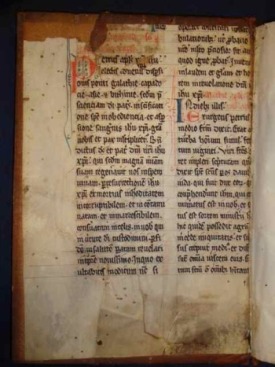"You Are a Chosen Race" -- 1 Peter 2:1-12
 Tuesday, February 23, 2016 at 10:06AM
Tuesday, February 23, 2016 at 10:06AM  The Fourth in a Series of Sermons on 1 Peter
The Fourth in a Series of Sermons on 1 Peter
Many of the elect exiles to whom Peter is writing have been forcibly removed from their homes, often because of their faith in Jesus Christ and for refusing to worship pagan deities. These exiles are undergoing a difficult time of trial and testing. They possess a heavenly citizenship and a living hope which determines what they believe and what they do. But how should these elect exiles think of themselves during their sojourn? Merely as individual sojourners, marking time until they die? What should their identity be as they struggle in this world, despised and rejected, and during times when their faith is put to the test? Peter answers this question in our text, vv. 1-12 of the second chapter of Peter’s first epistle.
In verses 13-19 of I Peter 1, the Apostle issues three imperatives (commands). These commands unfold against the background of the gospel promises made in the previous verses (vv. 3-12). Peter’s readers/hearers already have been sanctified by the Holy Spirit (set apart for God), already have been sprinkled with the blood of Jesus, and have been set apart for obedience. The commands which follow the gospel promises are given to the elect exiles (Christian believers) mentioned back in the opening verse of this epistle. Obedience to these imperatives, then, is the means through which elect exiles identify themselves as citizens of heaven (believers in Jesus), while they dwell in the midst of the civil kingdom, where they now find themselves undergoing various trials which test their faith.
The first imperative is that the Apostle instructs us to fix our hope upon Jesus (v. 13). Jesus will keep all of the promises he makes to us in the gospel. We live this life in light of the realization of God’s promise of a heavenly inheritance in the next. Second, Peter exhorts us to live holy lives which reflect the holiness of our creator and redeemer (vv. 14-16). We are to strive for holiness out of gratitude for all that God has done for us in Jesus Christ. The third imperative is that we are to live in the fear of the Lord, because the one we invoke as our Father is also judge of all the earth (vv. 17-19). The practical implications of these commands are spelled out in the next section of this epistle, vv. 1-12, of chapter 2.
Far too often the imperatives in I Peter (and similar passages) are read by American evangelicals in light of individual and personal sanctification–in other words Peter is talking to me (not a church or group of Christians) and these imperatives primarily refer to “my personal walk with the Lord.” But the Apostle mentions the “love of our brothers [and sisters]” and commands us to love one another (v. 22) using language which comes from the Old Testament, and which applied to the people of Israel–a nation chosen by God, and set apart for his purposes. Peter now applies to same language to Christians in the context of their membership in Christ’s church. The command to love one another which is worked out in the opening verses of the second chapter (vv. 1-3), and which leads to a discussion of the church’s identity (in vv. 4-10), reminds us that sanctification and the striving for holiness take place within the community of sinful people who together believe in Jesus Christ, and this mirrors the nation of Israel in the Old Testament as a people “set apart” by God unto himself and for his purposes.
To read the rest of this sermon: Click Here


Reader Comments